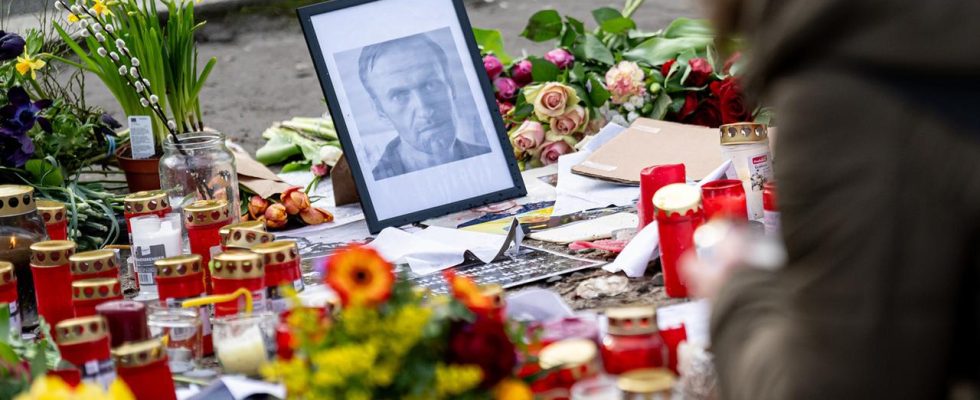Navalny’s team also assumes that the Kremlin opponent is dead: it was said that his mother had received an official notification. It is unclear where the body is currently located. Despite arrests, people across the country continue to mourn.
The team of imprisoned Kremlin opponent Alexei Navalny has confirmed his death and raised allegations of murder. “Nawalny was murdered,” wrote his spokeswoman Kira Yarmysch on X. The 47-year-old’s mother traveled to the prison camp in northern Russia and received official confirmation of her son’s death.
The death is said to have occurred on Friday at 2:17 p.m. local time (10:17 a.m. CET). Employees of the state investigative committee picked up the body, said Jarmysch. An employee of the prison camp said that the body had been taken to the city of Salekhard for examinations. The city is around 50 kilometers from the prison camp.
However, the Reuters news agency reported that the body had not yet arrived at the morgue there. An employee of the facility said this on the phone. Yarmysch also confirmed this. She demanded that Navalny’s body be handed over to his relatives immediately.
Human rights activists talk about murder
The circumstances of the death remain unclear. Russian authorities reported on Friday that Navalny had died. The 47-year-old, who was physically weak after many days in repeated solitary confinement, collapsed while walking in the prison camp in freezing temperatures. Attempts at resuscitation were unsuccessful, the prison service said. Human rights activists, on the other hand, accuse the Russian power apparatus of murder.
According to Navalny’s team, the prominent anti-corruption campaigner’s employees also assume that Navalny was deliberately killed. As a globally recognized Russian opposition leader, Navalny embodied the hope for a future after the dictatorship, wrote expert Alexander Baunow for the Carnegie think tank.
Even in the prison camp, the politician remained a nuisance for the Kremlin. “But the effort itself to get rid of such an irritating figure also shows that the regime is not as confident in itself and its future as it would like to appear,” said Baunow.
More than 110 arrests nationwide
Despite arrests and pressure from the authorities, people in Russia continue to publicly mourn the opposition activist. In Moscow and other cities, men in civilian clothes or city cleaning workers cleared spontaneously erected memorial sites. They packed flowers in garbage bags and collected candles and pictures. Media in many parts of Russia reported that fresh flowers continued to be laid, candles were lit and pictures were put up in memory of Navalny.
According to human rights activists, there were more than 110 arrests across the country. In St. Petersburg alone, the authorities had arrested 69 people by Saturday morning, said the online civil rights platform OVD-Info. The count only includes people whose identities are known and can be published. In total there were arrests in 13 Russian cities.
The civil rights activists also gave legal advice on laying flowers and published the number of a telephone hotline for legal help.
Many Russians publicly expressed their anger after Navalny’s death. “How great the power apparatus’ fear of a dead person is when even laying flowers in his memory is viewed as a crime,” wrote the Russian Nobel Peace Prize winner and founder of the Kremlin-critical newspaper Novaya Gazeta, Dmitri Muratov, on the Telegram news channel.
“There is absolutely no substitute”
Nobel Peace Prize winner Irina Scherbakova described Navalny’s death as a great loss for the opposition in the country. “There is absolutely no substitute when it comes to charisma and strength,” she said rbb. Figures like him are rare in politics anyway. The loss also affects the people who fight for a free Russia without President Vladimir Putin and want to live there.
For the co-founder of the human rights organization Memorial, which was banned by the Russian authorities, the death of the dissident is the “strongest political gesture that could be made.” Now Navalny is a symbol of a person who is “willing to die for his cause.”
Nevertheless, he never portrayed himself as a martyr, but rather made jokes. Even when he was arrested or in court, he didn’t appear tragic, but rather with humor. With regard to the war in Ukraine, the historian said: “You always have to keep that in mind. When you talk about peace negotiations, who are you negotiating with: actually with a murderous regime.”
Russia’s power apparatus repeatedly uses violence against critics. Protests have not been allowed in the country for years.

